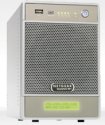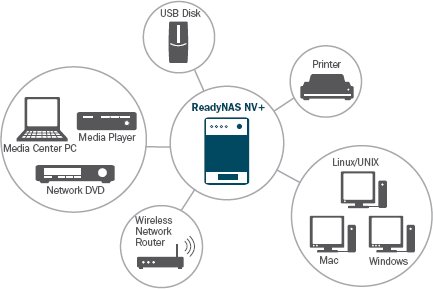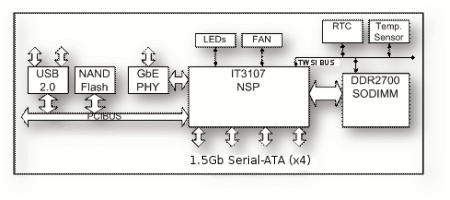Linux-based NAS storage devices expand capacity
Dec 21, 2007 — by Eric Brown — from the LinuxDevices Archive — 42 views Netgear has introduced five Linux-based networked attached storage (NAS) products. Targeted at “prosumers” and small to medium-sized businesses, Netgear's ReadyNAS NV+ systems offer higher capacities than previous Infrant models, and come in 1.5TB (terabyte), 2TB, 3TB, and 4TB versions, as well as a 4TB rackmount version.
Netgear has introduced five Linux-based networked attached storage (NAS) products. Targeted at “prosumers” and small to medium-sized businesses, Netgear's ReadyNAS NV+ systems offer higher capacities than previous Infrant models, and come in 1.5TB (terabyte), 2TB, 3TB, and 4TB versions, as well as a 4TB rackmount version.
(Click for a slightly larger view of the ReadyNAS NV+)
Netgear acquired the ReadyNAS line in May when it bought Infrant for $60 million. ReadyNAS devices run an Infrant-developed Linux distribution called RAIDiator, which is said to use patent-pending “X-RAID” (expandable RAID) technology aimed at enabling “automatic” RAID volume expansion as additional drives are added. Supporting NFS, rsync, SMB, ftp, and http file access, the ReadyNAS devices have a featureful Web GUI and, apparently new in the Netgear models, SSH access (although SSH may, as in the past, be limited to use as an rsync tunnel). There's also a USB print server built in, and a front USB port configurable to automatically backup media upon insertion.

ReadyNAS network diagram
Compared to earlier models, the new ReadyNAS NV+ entries are touted as having a longer warranty (five years), as well as improved storage capacity, manageability, usability, performance, and peripheral support. They all appear to be equipped with the IT3107 NSP developed by Infrant, which is based on a 32-bit SPARC RISC core.

IT3107 NSP system architecture
The new ReadyNAS models are:
- ReadyNAS NV+ 1.5TB Gigabit Desktop Storage (RND4275) — 2 x 750GB SATA drives
- ReadyNAS NV+ 2TB Gigabit Desktop Storage (RND4210) — 1 x 1TB SATA drive
- ReadyNAS NV+ 3TB Gigabit Desktop Storage (RND4475) — 4 x 750GB SATA drives
- ReadyNAS NV+ 4TB Gigabit Desktop Storage (RND4410) — 4 x 1TB SATA drives
- ReadyNAS 1100 4TB Dual Gigabit Rackmount Network Storage (RNR4410) - 4 x 1TB SATA drives
Each ReadyNAS features Gigabit Ethernet interfaces with Jumbo Frames support for improved throughput to and from the network backbone, says Netgear. All five models provide hot-swappable hard drives and support RAID 0, 1, and 5. They also support Netgear's proprietary X-RAID technology, which is said to enable users to automatically scale from one to four disks and beyond. Each system also comes with EMC Retrospect backup and recovery software for Windows systems.
Netgear provides full specs for three of the new models on their website. Here are some sample specs from the 1.5TB RND4275 model:
- Processor — IT3107 Network Storage Processor
- Memory — 256MB PC2700 DDR-SDREAM SO-DIMM; embedded 64MB Flash
- I/O — 4 x Serial ATA channels; 1 x 10/100/1000 Ethernet; 3 x USB 2.0
- Storage — Compatible with SATA and SATA IIHDD; hot swappable and lockable trays
- RAID — RAID 0, 1, 5, plus X-RAID single volume auto expansion
- Backup — EMC Retrospect backup and recovery software
- Other — LCD display; DHCP and print servers; Secure Shell (SSH) access
- Power supply — Fanless server-rated AC power supply; 100-240 VAC, 50/60Hz input
- Power consumption — 55 W typical (with 4 x 250GB disks); less with power saving mode
- Cooling — 92mm ball-bearing chassis cooling fan with failure alert and auto-shutdown option
- Dimensions — 7.9 x 5.2 x 8.7 inches (200 x 132 x 222 mm)
- Weight: 10 pounds (4.6 Kg) without disks
In June, the ReadyNAS NV won 8th place on PC World's top-100 products list. The device was lauded for its low, 55-Watt power consumption, as well as a power-saving mode that can spin down drives after a configurable time, for effective consumption of about 22 Watts. The new NV+ models offers similar power specs.
Availability
The Netgear ReadyNAS products are backed by a five-year hardware warranty and are immediately available, priced at $1,100 and up. More information and specs may be available here.
This article was originally published on LinuxDevices.com and has been donated to the open source community by QuinStreet Inc. Please visit LinuxToday.com for up-to-date news and articles about Linux and open source.